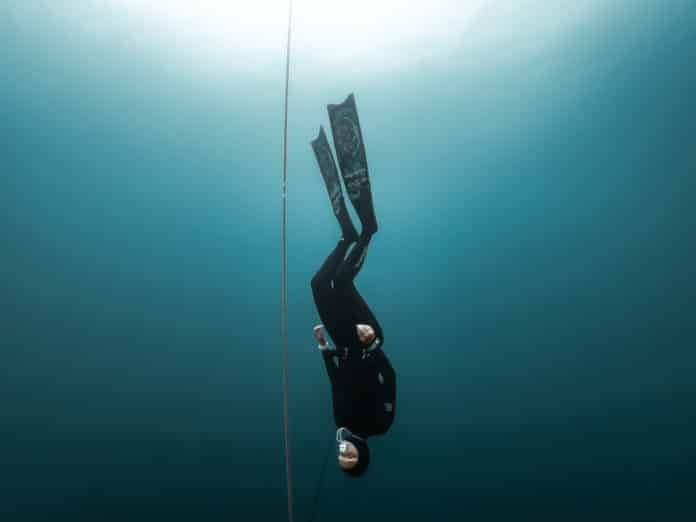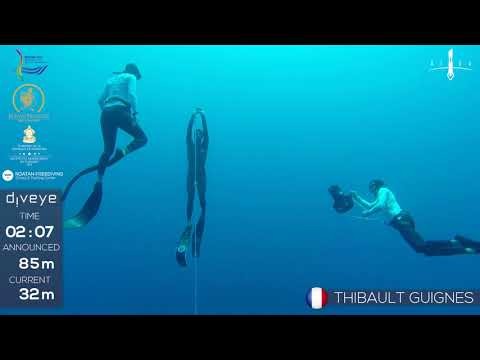In freediving, a good freefall can be a very tough thing to master. Maintaining an effective and efficient freefall while also staying streamlined, relaxed, and focusing on equalization can be a daunting and difficult task. There are 5 very common freefall mistakes that can occur on the journey to mastering the freefall; check them out below.
1. Legs Falling Backward
You are supposed to keep your legs relaxed during freefall, but unfortunately, if you keep them too relaxed, they will end up falling backward, causing you to fall at an angle and greatly slowing down your freefall. A good freefall should yield 1 meter per second; if it is slower than this, have a freediving coach or a buddy take a video of your freefall, and take a look at your leg position. If your fins are not parallel to the line, then your body positioning is inefficient. Remember to activate your pelvis; your legs should be slightly bent at the hips, and slightly bent at the knees in order to achieve the correct body positioning.
2. Extending The Arm When Holding The Line
Some freedivers prefer holding the line while freefalling so that they can keep their eyes closed, while others prefer to completely let go and open their eyes every once in a while to check their position on the line. But if your arm is extended out at a 90° angle, or even 45° angle, you are making yourself much less hydrodynamic, resulting in a slower freefall. This also creates tension in your upper chest and shoulder, which can make equalization more difficult. It is much more effective to keep your arm at your side, next to your leg, and hold the line so that it is running in line with your shoulder.
3. Tension In The Core
Often when freedivers begin learning freefall, they inadvertently keep tension in their core muscles. They still learned the freefall technique, but due to practicing bad habits, they eventually hit a barrier with depth due to equalization failure and the feeling of pressure. This is why it is important to keep the core relaxed and continuously check on its relaxation throughout the dive; as soon as you feel that equalization is failing or start to feel pressure on your chest, try consciously relaxing your core.
4. Incorrect Head Positioning
Often, nervous freedivers will mistakenly raise their heads at depth to look for the end of the line. Not only does this open them up to possible throat injuries, but it also slows down their freefall and can guide their fall away from the line rather than straight down. An extended neck can also impede equalization, making divers feel like they cannot equalize past a certain point. A good freefall includes a slightly tucked in chin, but not so tucked in that there is tension in the back of your neck.
5. Starting The Freefall Too Early
Knowing your neutral buoyancy is essential for an effective freefall, yet some freedivers may find themselves experiencing a very slow-starting freefall if they are not beginning their freefall late enough. A good rule of thumb is to set your freefall alarm to 5-7m (16-22ft) after the point of neutral buoyancy. Already being negatively buoyant, coupled with one or two stronger kicks or pulls after hearing the alarm, will ensure that your freefall is off to a good start. Make sure that your neutral buoyancy is at no less than 10m (32ft), and is located at about 1/3 of your target depth.
Final Thoughts
Learning an effective, efficient freefall can take a lot of time, patience, and hard work. The best way to learn freefall or to fix these common mistakes is to dive with an experienced buddy, or hire a freediving coach or instructor to follow you and observe your freefall themselves (or better yet, with a camera so that you can see for yourself). Freefalling effectively is the key to oxygen conservation, effective equalization, and achieving maximum relaxation on your dives, which will only make them deeper and more enjoyable. Invest in pleasurable, relaxed dives and do not accept rushed, sloppy dives just to reach deeper depths.


